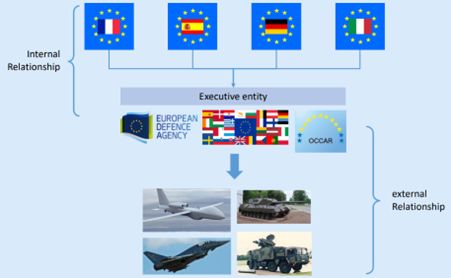As announced in January, BLOMSTEIN is publishing a series of briefings introducing into European and German legal defence matters. In our last briefing, we have provided some insight into the regulatory framework for the defence industry to produce and sell from the EU.
The cooperation of EU Member States regarding defence and security policy and activities ranks high on the European Union's agenda. This includes EU Member States' joint procurement of military and sensitive equipment within the meaning of Directive 2009/81 on procurements in the fields of defence and security. Advantages of such joint procurements to national procedures are manifold, including cost reductions through scale economies, facilitated in-use collaboration due to increased interoperability of material and a strengthening of allies.
This briefing gives an overview over the legal framework of such joint procurements. In practice, EU Member States assign the task of procuring equipment from suppliers (mainly private companies) to a single entity (Executive Entity), which, in turn, conducts the procurement for (the benefit of) all participating EU Member States. Candidates for the role as Executive Entity are, firstly, states – participating EU Member States or third countries – acting as a "lead nation". However, multinational institutions such as the European Defence Agency (EDA), NATO Support and Procurement Agency (NSPA) or Organisation Conjointe de Coopération en Matière d'Armement (OCCAR) can also take on this role.
Applicable procurement rules
For the question of applicable procurement rules, two sets of relationships must be distinguished. The participating Member States' interaction with the Executive Entity on the one hand (Internal Relationship), and the Executive Entity's procurement activities vis-à-vis equipment suppliers and service providers on the other (External Relationship).

As far as the External Relationship is concerned, in case an EU Member State acts as lead nation, its national procurement law transposing Directive 2009/81 applies. If the EDA acts as Executive Entity, Directive 2009/81 applies where the EDA procures (majorly) for EU Member State(s). International organizations such as OCCAR and NSPA are neither subject to EU primary nor EU secondary law and, consequently, apply their own procurement rules.
However, public procurement law does not only play a role in the External Relationship. Rather, it is noteworthy that it also applies to the Internal Relationship. Consequently, EU Member States are not free to engage an Executive Entity to procure for them without having to adhere to their national procurement law. Rather, the engagement of an Executive Entity is subject to Directive 2009/81. However, there are a few exemptions from this directive (and its national transpositions) that may apply, depending on who is acting as Executive Entity. Of significant relevance is the exemption for government-to-government contracts pursuant to Article 13(f) of Directive 2009/81, which will be applicable if a lead nation is tasked with the procurement.
If the EDA is acting as Executive Entity, Article 10 of Directive 2009/81 may be applicable, that exempts tasking a central purchasing body with conducting a procurement procedure. However, the applicability of an exemption is most questionable in case multinational organisations such as OCCAR or NSPA act as the Executive Entity. Relying on Article 10 of Directive 2009/81 will be difficult as that would require those organisations having procedural rules (and legal protection) comparable to Directive 2009/81. In our view, that is not the case. For the same reason, most other exemptions are not likely to apply either. The only exemption debatable is Article 12(c) of Directive 2009/81 that explicitly exempts procurements by international organisations "purchasing for its purposes" from the applicability of the Directive. However, it is still not clear if "purposes" restricts the applicability of the provision to the procurement of equipment that the international organisation uses itself (e.g., next generation AWACS for NATO).
Legal protection
For the question of legal protection, the External and Internal Relationship must again be distinguished.
Legal protection in the External Relationship against the Executive Entity's conduct can be sought (only) according to whichever legal regime the entity applies. If an EU Member State acts as lead nation, tenderers can initiate a review procedure pursuant to the lead nation's national law transposing Directive 2009/81. The review procedure of Directive 2009/81 is also open to claimants where the EDA acts as Executive Entity. Because international organizations are in general not subject to any national state's or supranational institution's jurisdiction, claimants depend on review procedures put in place by international organizations themselves. However, this international law truism has recently been challenged in cases regarding multilateral development banks in different jurisdictions such as USA and Uganda.
Referring to legal protection in the Internal Relationship, the participating EU Member States' interaction with any Executive Entity can be made subject to a review procedure as it – as shown above – falls in the scope of Directive 2009/81. Hence, claimants can particularly challenge an EU Member States' decision to procure via an Executive Entity and the applicability of an exemption from either secondary or primary law.
The content of this article is intended to provide a general guide to the subject matter. Specialist advice should be sought about your specific circumstances.

